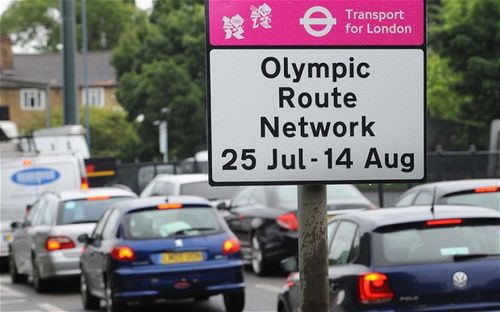
So it’s getting towards the stage where London winds down or up for the Olympics, dependent upon your point of view.
London is certainly getting more and more confused about the Olympics, with signs all over the underground and on the roads about the Games, with an equal number of drivers and travellers confused about what the heck is going on.

Pic from Sky News of the M4 Motorway chaos as Olympic Lanes came into operation last week
I’m not going to blog about the Olympics all the time over the next month, but will be attending a few of the events so thought it worth noting: what are the Olympics worth?
This was a question a TV journalist asked me the other day, in terms of the economics of the Olympics, so I did a bit of investigating.
Frist, the cost of the Olympics is about £11 billion in public funding, according to a Parliamentary Report of December 2011, with £9.3 billion specifically allocated for the Games itself.
This figure is higher than the amount quoted in Business Insider, which reckons the cost of hosting the games to be £8.5 billion ($13 billion) or 0.55 percent of annual UK GDP or 1.4 percent of annual government revenues.
But they note that “a significant portion of this is expected to be recovered by sale of land and other facilities over time”, along with other short and long-term impacts.
“In the short-term, the biggest impact is through expenses on goods and services, through temporary employment and indirect effects. Goldman (Sachs) expects the Olympics will boost UK economic output in the third quarter of 2013 by around 0.3 - 0.4 percentage points quarter-over-quarter (QoQ) (+1.2-1.6%qoq annualized), but this will be largely reversed in the fourth quarter.
“In the longer run, the UK would benefit from being a tourist destination and a location for foreign investment. Run-down parts of London will also benefit from the regeneration, but with London already being a tourism hub the benefit could be more limited.”
True, true.
However, any economic analysis is open to interpretation, so the best place to get a truly accurate Olympics economic picture is probably with the Economist.
I was particularly taken with this article about who wins and who loses:
The British government’s budget for the games has risen to £9.3 billion ($14.5 billion) from an initial estimate of £2.4 billion. The International Olympic Committee (IOC) has raised $4.87 billion in broadcast fees and sponsorship for the four-year cycle that includes the London summer games as well as the Vancouver winter Olympics of 2010. The London Organising Committee of the Olympic and Paralympic Games (LOCOG), which is actually in charge of staging the games, has raised another £700m in sponsorship; it is raking in pots more by selling tickets and licensing souvenirs.
Eleven global sponsors (known as top Olympic partners, or TOPs) pay fat sums to the IOC for the right to use the Olympic brand. Only one TOP sponsor is allowed in each commercial category: Coca-Cola for soft drinks, Panasonic for televisions and so on … top-tier deals are long-term (at least eight years) and global. The size of each deal is secret, but the total for all 11 for 2009-12 is $957m.
Sponsors can pay in cash, in kind, or both. For example, Atos, a French consultancy, is a top-tier sponsor. It also manages the information technology for the games. In its command room overlooking London’s Docklands, 450 technicians and support staff hunch over screens. Among other things Atos handles the accreditation system for all 250,000 athletes, trainers and hangers-on. This means creating a big database for personal information for people from all parts of the world. It has to hook up with the British immigration authorities, so everyone who needs a visa gets one. And it has to be secure: visiting prime ministers don’t want their private data published on WikiLeaks.
The pay-off for Atos comes from proving it can do all this. “It’s the only project of this magnitude that has a deadline you can’t change at all,” says Patrick Adiba, Atos’s man on the spot. There is also no room for serious errors, he says: “You can’t ask Usain Bolt to rerun the 100 metres because the technology didn’t work.” So every system has backups: some have four.
All this is costly. But it lets Atos boast to potential customers: if we can handle both the summer and winter Olympics, we can probably handle your project. The Olympics generate hundreds of millions of euros of new business for Atos every year, reckons Mr Adiba …
A study by Jonathan Jensen of Columbia College, Chicago and Anne Hsu of Relay Worldwide, a sports-marketing firm, has found that in general companies that sponsor generously tend to do well. They looked at the 51 American firms that spent more than $15m annually on sponsorship (mostly of sports) between 2005 and 2009. Net income at these firms grew faster than at S&P 500 firms in general (7.8% to 6.5% per year). The biggest sponsors did even better: the top 16, which spent on average $160m a year on sponsorship, saw net income grow by 22.1% annually.
The authors do not claim that sponsorship makes businesses more profitable. Rather, big sponsors tend to be firms with brands that are already well-known. Lesser-known firms buy ads to explain to customers who they are …
Visa’s first Olympic campaign was brutal. Having displaced American Express as the official payment card, its ads crowed: “At the 1988 Winter Olympics, they will honour speed, stamina and skill—but not American Express.” Its recent Olympic ads conform more closely to the generic feel-good norm. One shows Nadia Comaneci, a gymnast, scoring a perfect 10. Morgan Freeman’s soothing voice-over encourages viewers to cheer for perfection …
Below the global sponsors are the domestic ones: some 44 companies, from BP to Cadbury, have signed deals with LOCOG that cover only Britain. As well as dealing with these domestic sponsors, LOCOG hires contractors to help stage the games. A separate body, the Olympic Delivery Authority (ODA), is in charge of building the venue.
Between them, LOCOG and the ODA have awarded more than 2,000 contracts, big and small …
Pierre de Coubertin, the idealistic Frenchman who founded the modern Olympics in 1896, did not approve of betting. Heaven knows what he would have made of the bets that broadcasters make on the games. For 2009-12, they have stumped up $3.91 billion for television rights, up from $2.57 billion for 2005-08.
Such huge fees make bidding for the rings highly risky. NBC Universal, an American TV company, lost $223m broadcasting the Vancouver winter Olympics, and expects to lose money in London, too. Having paid $1.18 billion for the right to broadcast the London Olympics in America it has so far booked only $950m in advertising. It will sell more ads at the last moment. But it will also spend a fortune on cameras, servers and breathless commentary, leaving it $100m-200m in the red, by one estimate.
Comcast, the cable firm that owns NBC, is confident that the bet will eventually pay off. NBC will pay $4.38 billion to broadcast the games from 2014 to 2020 …
Michael Nathanson of Nomura, an investment bank, predicts that the Olympics will pump up the American ad market by between $800m and $1 billion this year. The global bump in advertising will be $1.3 billion, reckons Jonathan Barnard of ZenithOptimedia, a consultancy …
As can be seen, these Games are big business and big news.
More on the economics of the Olympics throughout the next two weeks, but hopefully only stuff that makes for general interest.
Meantime, I’m off to work out these new Olympic zil lanes.

Chris M Skinner
Chris Skinner is best known as an independent commentator on the financial markets through his blog, TheFinanser.com, as author of the bestselling book Digital Bank, and Chair of the European networking forum the Financial Services Club. He has been voted one of the most influential people in banking by The Financial Brand (as well as one of the best blogs), a FinTech Titan (Next Bank), one of the Fintech Leaders you need to follow (City AM, Deluxe and Jax Finance), as well as one of the Top 40 most influential people in financial technology by the Wall Street Journal's Financial News. To learn more click here...




















